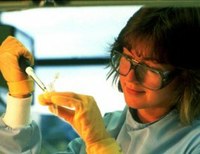Laboratory Technician (biology)

Vicky
Technician working in biomarker research
Once a week I travel up to college with my friends from work to study for my Degree. Vicky
So, what do you do?
I am involved in the early stages of drug development, prior to testing of a treatment in humans. Certain departments focus on specific therapeutic areas (Pain, Urology, Allergies and respiratory conditions, etc.). At the moment I am working on biomarker research for projects within these departments, with the aim of increasing our understanding of how and when a drug is working in various models. This means I work on a number of therapeutic targets across early development, and I enjoy that variety.
What does your typical day involve?
Most of my day is lab based. My supervisor will discuss and prioritise project work with me for a week, and then I decide which days I will run them on. In the past four years I have carried out a range of techniques, including cell culture, immunoassays and molecular biology techniques, such as PCR, cloning, and transfection. After an experiment I analyse my data, and based upon that decide what other experiments need to be done. Once a week I travel up to college with my friends from work to study for my Degree.
Do you work mostly on your own or as part of team?
I work in a lab with several other people. As I use compounds generated by chemists, or samples from other biologists I have had contact with people in various departments for every project I have worked on.
What is it like socially where you work?
There is a good social atmosphere- I have friends and contacts in lots of different departments.
What qualifications and experience do you have?
I started work with 9 GCSEs, an AS-level in Maths, and A-Levels including Biology, Chemistry, and Physics. I have already completed my Higher National Certificate, and am about to enter the final year of my Biology degree.
Do you think additional qualifications or experience would be an advantage for someone entering the industry now?
In my opinion, although it is important to have the right qualifications, I would really say experience makes all the difference. I would strongly recommend that people do sandwich placements, or summer jobs wherever there is the opportunity, as it looks good on a CV.
How has your career developed since you entered the industry?
Our career path is fairly set through the degree course that is run, so we have been promoted regularly as we study, with salary increases over the years. As the emphasis of my job is lab based work I have leant a range of techniques. I originally started work in a group which focussed on high throughput screening assays, but am now working in a biomarker research department.
Why did you decide on a career in the pharmaceutical industry?
I always enjoyed science at school and was aiming for a job in science around the time of my GCSEs.
I heard about the part-time degree scheme when I was studying for my AS-levels. It came at a time when I was really trying to consider what to do long-term, as I really felt I didn’t want to necessarily go to university. All the careers information I was given at school was basically if I wanted a job in science I had to go and get a full-time degree. Aside from the issue of financing studies (which I felt was a major one), I knew I really enjoyed the practical side - actually running the experiments. In the university open days and interviews I attended I felt that an apprenticeship would be a much better option for me.
What possibilities are there for your career in the future?
I finish my degree in a year. I have no solid plans yet, I will either stay in my position and develop within the company, or further my studies - I’m considering a PhD.
What are you most proud of in your career?
Last year I took part in an event called Biology Project Week. I supervised two AS-levels students in mini project, where they ran experiments, attended lectures and discussions, and had to review and present their data to an audience at then end of the week. This was meaningful for me, as I had taken part when I was at school 4 years beforehand, and it was really influential in my career decision. It was quite a buzz seeing the progress they made in a few days, and was brilliant that it gave some of the students more confidence in their career plans as a result.
What do you think are the most important skills for someone in your role to have?
Its really important to be able to ask questions, and to have the courage to say if you don’t understand something – there are so many people with expertise in a diverse range of areas here. It’s a great environment to be able to learn from colleagues. which is really useful as a trainee if you ever need advice or help with something. I find that most projects throw up unexpected data and need you to troubleshoot. The more people you can chat to about it, the more ideas you get to help you solve the scientific question.
What one piece of advice would you give to someone seeking a career in the pharmaceutical industry?
Its really worthwhile to get some sort of practical experience wherever possible. Summer jobs or sandwich placements not only look good on for job applications, but are a really important way to make sure you actually want a career in pharmaceutical research.
Last modified: 20 September 2023
Last reviewed: 20 September 2023